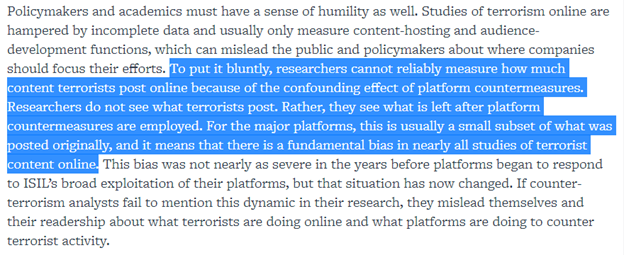They found that suspensions did have an impact on replies and retweets and overall dissemination. https://t.co/G12JUYtuzK
1. (THREAD) So, it seems like the deplatforming debate is once again kicking off, so I thought I would introduce some of the earlier work that was done in this area back when ISIS was buck wild on social media. What have we learned over the last six years might be useful today:
They found that suspensions did have an impact on replies and retweets and overall dissemination. https://t.co/G12JUYtuzK

You can read my thoughts on the Islamic State’s online community here: https://t.co/1qSfLBNkyf
Elizabeth pearson has also discussed this issue here: https://t.co/Yloq6pHVQJ
1. NEW by me, @ShirazMaher, and @charliewinter for @crest_research.
— Amarnath Amarasingam (@AmarAmarasingam) January 8, 2021
Anyone paying to ISIS channels on Telegram in 2019 noticed something strange in late November: they started to disappear en masse. We decided to take a closer look at the data. https://t.co/ZG13ppBJxO pic.twitter.com/WaOj5YVGNn
More from Internet
SolarWinds follow up. Very good tweet explaining what happened.
Basically what this means is that SolarWinds itself was exploited. Someone posted an infected update as legitimate (digitally signed), leading customers to download a bad update.
“Multiple trojanized updates were digitally signed from March - May 2020 and posted to the SolarWinds updates website” https://t.co/8e3bMFWXYu

FireEye then explains that infected organizations were approached and exploited. This is a separate Step 2.
At this point, information is already going to “malicious domains” without extra intervention, after the malware does nothing for “up to two weeks”

Hackers reportedly slipped malware into prior SolarWinds software updates, which gave them access to a "God-mode" for infected networks, including the Treasury and Commerce departments.
— Wes Wilson (@weswilson4) December 14, 2020
The Pentagon is also a SolarWinds customer.https://t.co/Srcoztssol https://t.co/OgMhAjJqPx
Basically what this means is that SolarWinds itself was exploited. Someone posted an infected update as legitimate (digitally signed), leading customers to download a bad update.
“Multiple trojanized updates were digitally signed from March - May 2020 and posted to the SolarWinds updates website” https://t.co/8e3bMFWXYu

FireEye then explains that infected organizations were approached and exploited. This is a separate Step 2.
At this point, information is already going to “malicious domains” without extra intervention, after the malware does nothing for “up to two weeks”













